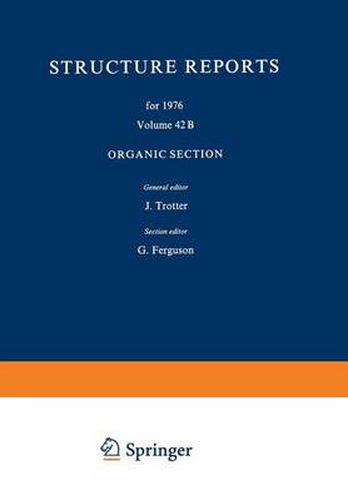Readings Newsletter
Become a Readings Member to make your shopping experience even easier.
Sign in or sign up for free!
You’re not far away from qualifying for FREE standard shipping within Australia
You’ve qualified for FREE standard shipping within Australia
The cart is loading…






This title is printed to order. This book may have been self-published. If so, we cannot guarantee the quality of the content. In the main most books will have gone through the editing process however some may not. We therefore suggest that you be aware of this before ordering this book. If in doubt check either the author or publisher’s details as we are unable to accept any returns unless they are faulty. Please contact us if you have any questions.
The present volume continues the aim of Structure Reports to present critical accounts of all crystallographic structure determip. ations. The increase in the number of crystal structure papers (now about 2000 per year in the Organic Section) has prompted a minor change in format, which increases the information density per page, hopefully without any loss of clarity. Details of the arrangement in the volumes, symbols used etc. are given in previous volumes (e. g. 41 B or 42A, pages vi-viii). J. TROTTER University of British Columbia Vancouver, Canada 14 September 1978 [VI] STRUCTURE REPORTS SECTION III ORGANIC COMPOUNDS Edited by G. Ferguson with the assistance of M. Currie D. F. Rendle J. Iball S. J. Rettig A. L. Macdonald S. N. Scrimgeour W. C. Marsh J. C. Speakman M. Napier ARRANGEMENT To find a particular organic compound the subject index or the formula index should be used. The general arrangement is: aliphatic or open-chain compounds; open chains with N, S; benzene derivatives; cyclic hydrocarbons; condensed ring systems; heterocyclic compounds; carbohydrates, amino-acids, natural products; molecular complexes; organometallic compounds - B, Si, P, As, Sb, groups lA, IIA, III, IV, VI; transition metal complexes - w-complexes, other ligands. Only com plete structure analyses are described; compounds for which only lattice para meters are determined, and those which have been described only in preliminary communications and for which details will appear at a later date, have not been reported.
$9.00 standard shipping within Australia
FREE standard shipping within Australia for orders over $100.00
Express & International shipping calculated at checkout
Stock availability can be subject to change without notice. We recommend calling the shop or contacting our online team to check availability of low stock items. Please see our Shopping Online page for more details.
This title is printed to order. This book may have been self-published. If so, we cannot guarantee the quality of the content. In the main most books will have gone through the editing process however some may not. We therefore suggest that you be aware of this before ordering this book. If in doubt check either the author or publisher’s details as we are unable to accept any returns unless they are faulty. Please contact us if you have any questions.
The present volume continues the aim of Structure Reports to present critical accounts of all crystallographic structure determip. ations. The increase in the number of crystal structure papers (now about 2000 per year in the Organic Section) has prompted a minor change in format, which increases the information density per page, hopefully without any loss of clarity. Details of the arrangement in the volumes, symbols used etc. are given in previous volumes (e. g. 41 B or 42A, pages vi-viii). J. TROTTER University of British Columbia Vancouver, Canada 14 September 1978 [VI] STRUCTURE REPORTS SECTION III ORGANIC COMPOUNDS Edited by G. Ferguson with the assistance of M. Currie D. F. Rendle J. Iball S. J. Rettig A. L. Macdonald S. N. Scrimgeour W. C. Marsh J. C. Speakman M. Napier ARRANGEMENT To find a particular organic compound the subject index or the formula index should be used. The general arrangement is: aliphatic or open-chain compounds; open chains with N, S; benzene derivatives; cyclic hydrocarbons; condensed ring systems; heterocyclic compounds; carbohydrates, amino-acids, natural products; molecular complexes; organometallic compounds - B, Si, P, As, Sb, groups lA, IIA, III, IV, VI; transition metal complexes - w-complexes, other ligands. Only com plete structure analyses are described; compounds for which only lattice para meters are determined, and those which have been described only in preliminary communications and for which details will appear at a later date, have not been reported.